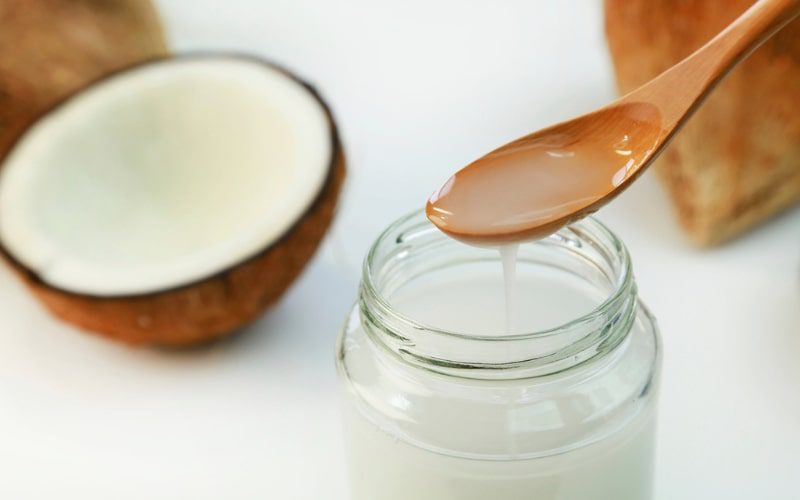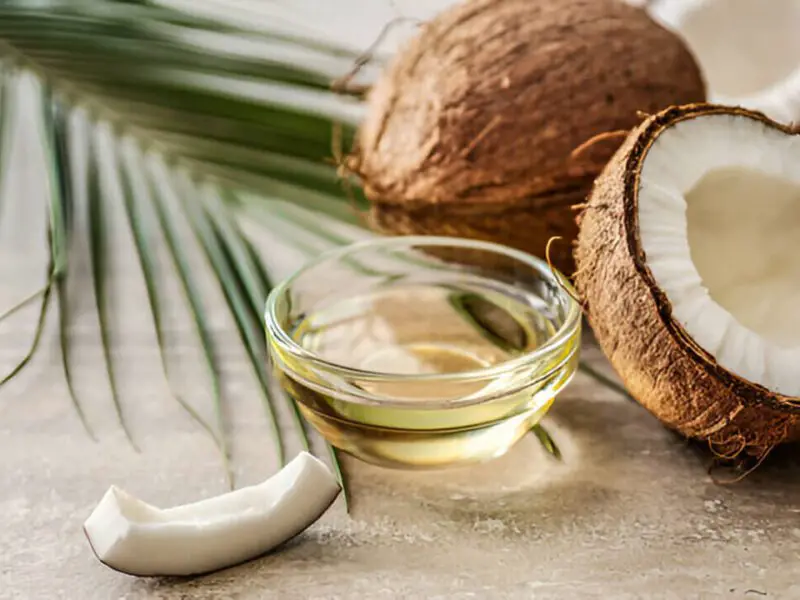Every now and then, a specific meal becomes really popular. Their advantages are heavily promoted, and everyone rushes out to buy them. People, on the other hand, become bored with time.
Coconut oil is one such popular commodity. Many individuals have it in their pantry but haven’t used it much since purchasing it.
So, does coconut oil go bad? And how can one extend it’s shelf life? More to come on this later.
Let’s start with the numerous health benefits that this oil provides.
Coconut Oil’s Health Benefits
Coconut oil is often advertised as a heart-healthy cooking oil. It has a high concentration of HDL, or healthy cholesterol. It may also help neutralize the effects of LDL (bad) cholesterol.
This makes it an excellent cooking oil for people with coronary heart disease. Coronary heart disease is distinguished by blocked arteries, which impact blood pressure.
Coconut-consuming communities have been shown to have low incidences of heart disease. Coconuts are the source of coconut oil.

Coconut oil is very rich in lauric acid. This is a beneficial fatty acid that can only be found in high concentrations in breast milk.
This oil is high in saturated fats as well. They help with metabolism. This gives the body extra energy and can help with weight loss.
It also includes medium-chain triglycerides, which the liver converts to ketones. Ketones are beneficial to brain function.
Coconut oil is also thought to help with weight loss by increasing calorie burn. However, consuming the oil alone may lead to weight gain.
Oil pulling using coconut oil has also grown in popularity. This is how it’s used as mouthwash. It has antibacterial qualities that are believed to fight bacteria in the mouth.
Oil pulling is also said to promote dental health and eliminate mouth odor.
Coconut oil may also be used to make cosmetics. It is used on the skin and hair. It is said to be beneficial for moisturizing.
It has also been shown to be useful in lowering the symptoms of skin conditions such as eczema.
All of these advantages suggest that coconut oil should be consumed as quickly as possible. So, how long can people expect to be able to utilize this product in a safe manner?
How Long Does Coconut Oil Last?
The shelf life of virgin coconut oil that has been properly preserved is rather long. The most nutritious kind of coconut oil is virgin coconut oil. The refined oils, on the other hand, are extracted using chemical solvents or an expeller machine.

Do you refrigerate coconut oil? And at what temperature does coconut oil melt?
Coconut oil can be kept in the refrigerator or at room temperature. It is usually solid, although it can melt at around 75° F. If the temperature in the room increases above this level, the oil will melt. Even in its liquefied condition, it is still safe.
To help extend its life, find a location where it won’t be exposed to extreme temperature changes. A dark, quiet area of the kitchen pantry is a good bet.
Coconut oil gradually deteriorates over time. Product packaging is the best indicator of shelf life. Typically, the manufacturer will specify a “best by” date.
Take this as an indication of how long oil will be viable. However, if it is not contaminated, it may survive much longer. Contamination is a common cause of spoilage.
Coconut oil, both refined and virgin, should last for 3-6 months if stored properly. This is after the “best by” date has passed.
So, how can you know if the oil went bad before or after this date?
How Long Does Coconut Oil Last?
Coconut, being an organic product, can easily go bad. However, it is a highly stable foil with a long shelf life. Manufacturers often provide a “best by” date within 2-4 years of production before it’s expiration.
A color change is one of the most common symptoms of deterioration. When solid, coconut oil should be milky white, and when liquid, it should be transparent. If it begins to turn yellow, it is most likely expired.
Coconut oil is also recognized for its smooth texture. It may already be spoiled if it becomes thick.
Unknown particles floating around can be another clue, as can black flecks in the container, which could signal mold is growing. In such circumstances, it is advisable to remove the entire content.

The coconut aroma is unique and fresh-smelling. If the oil has gone bad, it emits a rotten stench.
If used for oil pulling or cooking, you will detect a change in flavor if it has gone bad. As a result of spoiling, the slight natural coconut taste will have become sour.
You might not become sick right away if you consume rancid coconut oil or oils in general. However, they might damage cells, resulting in heart disease or cancer.
With such negative consequences, how should coconut oil be stored?
Read More:
What Is The Best Way To Store Coconut Oil?
Coconut oil needs to be stored at room temperature in a cool, dark area. Excessive exposure to light, heat, and moisture can cause it to get rancid.
Coconut oil performs best when maintained at a constant temperature. It doesn’t matter if it’s in the pantry or the fridge.
Too many changes can trigger chemical reactions that impact rancidity.
It’s important to remember that it’ll be more solid in the fridge. It depends on the temperature of the pantry.
It’s also necessary to scoop out the oil with a clean utensil. This will avoid contamination that might lead to the introduction of hazardous microorganisms.
It is also critical to keep the container well sealed. It guards against germs and oxidation, which can accelerate spoilage.
Conclusion
Coconut oil has several health and cosmetic qualities. It has a long shelf life, which may last for years if properly maintained.
It must also be handled in a sanitary manner to avoid the entry of contaminants. Keep an eye on its exposure to temperature fluctuations to help extend its life. And keep it well packed to prevent oxidation.



